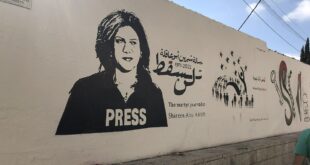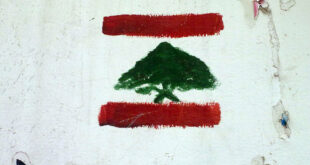Panel: "Media Diplomacy: Who Controls the Control Room?"
National Press Club, Washington, D.C.
5-6 October 2004
By far the most lively panel during October's annual Middle East Institute (MEI) conference in Washington, D.C., was "Media Diplomacy: Who Controls the Control Room?" featuring interesting insights from independent filmmaker Jehane Noujaim and The Washington Post's Islamic Affairs correspondent Anthony Shadid, as well as some heated exchanges between Al Jazeera's Washington bureau chief Hafiz Al Mirazi and Norman Pattitz, who oversees the US-sponsored Alhurra Arabic-language satellite television station.
MEI Director of Programs David Chambers moderated discussion and asked participants to examine the panel's theme from a commercial perspective. As he said, even for government-linked ventures like Al Jazeera and Alhurra, media is a commercial industry aimed at attracting an audience, not an art. In conjunction with this, Chambers pushed panelists to address how governments influence media coverage of the Middle East, and whether or not this has contributed to a "media war" between the US press and its counterpart in the Arab World.
Egyptian-American Jehane Noujaim explained how commercial success through her work at MTV and independent film enabled her to produce Control Room, a documentary that explores how Al Jazeera and US Central Command (CENTCOM)--both based just minutes apart in the tiny state of Qatar--covered the initial stages of the 2003 war in Iraq. Noujaim related her fascination with Al Jazeera since its inception in 1997, when it appeared to be something Washington would welcome because of its unprecedented criticism of Arab regimes. But she noted that many in the United States ended up demonizing the station as a "Taliban mouthpiece" that embraced incendiary reporting. Noujaim's goal with Control Room was to get behind such labels and put a human face on Al Jazeera, using interviews with its staff to demonstrate a more "complicated" view: the notion that the station was not intrinsically hostile to the United States, but was striving to report events from an independent perspective, albeit one not always in tune with the US government line. She eschewed the notion of a media war between the US press and the Arab press, citing the friendly relations she observed between American and Al Jazeera reporters who were both covering events at CENTCOM, and described how upset and surprised Al Jazeera's executive producer was when he saw a program from a US media outlet that repeatedly termed his station "anti-American." Noujaim supplemented her remarks with two clips from Control Room, now for sale on DVD with extended footage.
The Washington Post's Anthony Shadid, who won a Pulitzer Prize for reporting on average Iraqis in Baghdad during the US invasion, also distanced himself from the idea of a media war between US and Arab media outlets. Shadid said he viewed Arab reporters as colleagues and that he applied to work out of Al Jazeera's bureau in Iraq, although the station refused. He noted that this turned out to be for the best, since US forces bombed Al Jazeera's offices during the war. Instead of strife between respective media outlets, Shadid saw a more significant conflict between reporters on one side and governments on the other. He expressed concern about the lack of protection and respect that political entities have afforded to journalists, whether in the case of the government of Israel (where he was hurt reporting) or Iraqi insurgents. Shadid also worried that the practice of embedding with US forces in Iraq offered a level of protection, but hampered journalists from seeing both sides of a story. He acknowledged that his reporting on ordinary Iraqis could also be perceived as one-sided, but he felt this perspective was not being given elsewhere in the US press and that Americans needed to hear it. Shadid expressed hope that journalists would strive to cover all sides of events as comprehensively as possible, despite the continuing obstacles to doing so. Chambers asked Shadid how he managed to report Iraqis' views during the war without drawing the ire of the US government, which castigated Arabic satellite stations for that. Shadid responded that it was a matter of audience. The US was more concerned about Arab satellite stations because their consumers were the Arab public, but Shadid's material was geared for a US audience and would make less of an impact in the Arab World.
Heated exchanges between Norman Pattitz and Hafiz Al Mirazi belied assertions from each of them that there is no media war in the Middle East. During discussion, the government ties of both Al Jazeera and Alhurra became apparent. Although Al Jazeera has striven to be a purely commercial enterprise, it has continued to rely on support from the Qatari government to survive because Arab governments have intimidated regional companies from advertising on its airwaves. This governmental link influences Al Jazeera's reporting to some extent. As for Alhurra, Pattitz explained that the US-funded Broadcasting Board of Governors (BBG) oversees the station's operation, but that the BBG acts as a firewall between Alhurra and the US government, which has no say about the content of broadcasts.
Al Mirazi, however, asserted that Al Jazeera's reporting was much more independent than Alhurra's, and he ridiculed Norman Pattitz's claim to the contrary. According to Al Mirazi, when stations all over the world interrupted their programming to break the news of Israel's assassination of Palestinian Hamas founder Sheikh Yassin, Alhurra kept broadcasting a cooking show. Al Mirazi also claimed that Alhurra carried only Condoleezza Rice's refutation of Richard Clarke's testimony, omitting the latter's criticism of the Bush administration. He added that the independent board that oversees Alhurra is probably the same one that investigated the Abu Ghraib prison scandal, and that US funding of Alhurra is similar to that of Halliburton.
Pattitz countered by explaining that Alhurra is not an all-news network, and aims to create a niche for itself through a broader range of programming. He added that Alhurra is not in the policymaking area, and that the extensive coverage of both the Kerry and Bush campaigns was evidence of that. Pattitz also noted that Alhurra is in the model of the BBC, which audiences rate as very credible despite its ties to the British government. He cited two recent studies from the French firm Ipsos and America's A.C. Nielsen that, despite Alhurra's much lower market share vis-à-vis Al Jazeera and other Arab stations, of those who do watch Alhurra, between 53 and 66 percent rated its reporting as credible. Pattitz accused Al Jazeera of using inflammatory images in a promotion for its news broadcasts, including the Sheikh Yassin funeral, demonstrations where participants stomped on US and Israeli flags, and conflicts between Israeli soldiers and Palestinian youths.
For all the controversy, those who have spent the most time reporting on the ground from the Middle East in the past year, Shadid and Noujaim, said that Arabs have been telling them that policy change, not media information, is most likely to induce a favorable perception of America in the Middle East.
A complete transcript and MP3 audio stream of the panel is online at http://www.mideasti.org/articles/doc275.html.
 Arab Media & Society The Arab Media Hub
Arab Media & Society The Arab Media Hub




